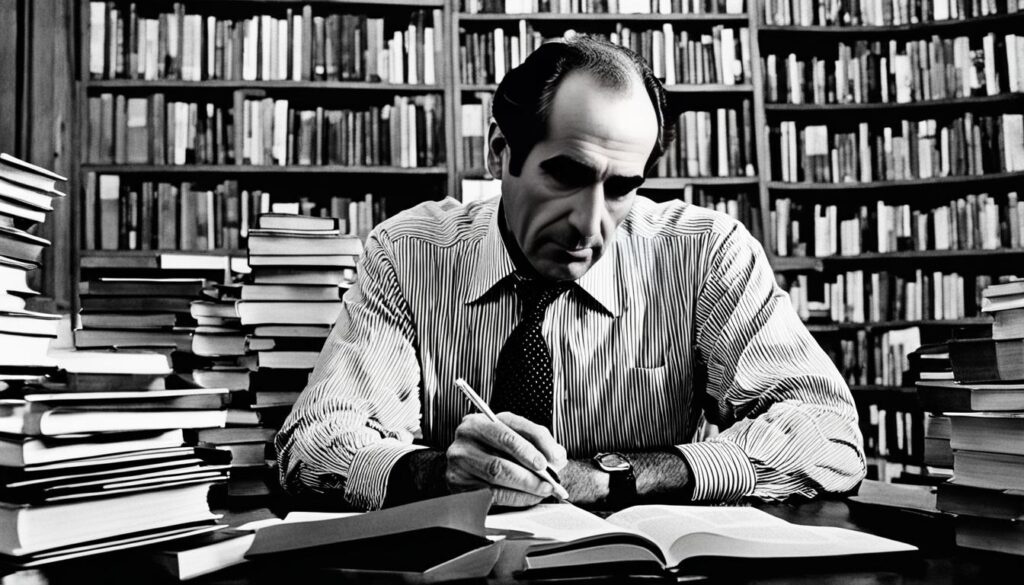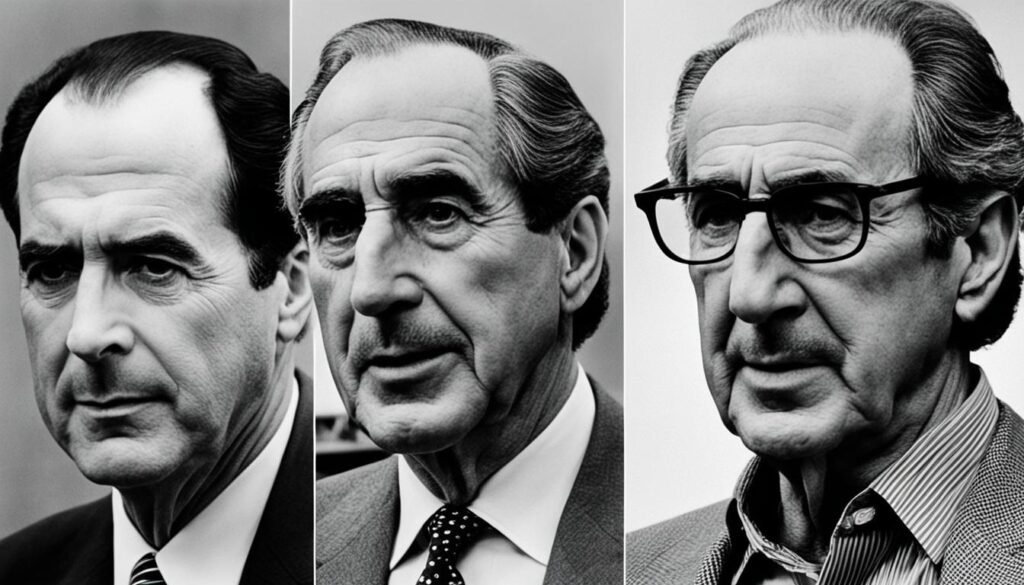In this audiobook review, we explore the fictional world of Philip Roth’s “The Plot Against America,” a novel that presents an alternative history of America where the famous pilot and anti-Semitic hero Charles Lindbergh wins the 1940 presidential election over Franklin D. Roosevelt. Set in Newark, New Jersey, “The Plot Against America” captures the texture and nuance of a family inextricably intertwined with the political reality of its time.
As we delve into Roth’s masterful storytelling, we examine the characters, themes, and symbolism that make “The Plot Against America” a compelling and thought-provoking read. From the historical context on which the novel is based to the critical reception and awards it has received since its publication, we leave no stone unturned in our exploration of this audiobook.
Key Takeaways
- Philip Roth’s “The Plot Against America” presents an alternative history of America and captures the texture and nuance of a family inextricably intertwined with the political reality of its time.
- The novel explores themes of antisemitism, populism, and authoritarianism that remain relevant today.
- The audiobook version offers a compelling listening experience.
- “The Plot Against America” has been critically acclaimed and has received several awards since its publication.
- Fans of this audiobook may also enjoy other works that explore similar themes or writing styles.
Overview of “The Plot Against America”
“The Plot Against America” by Philip Roth is an alternate history novel that imagines a dystopian America. The book follows the story of the Roth family, who live in Newark during the 1940s. In this alternate world, the well-known aviator, Charles Lindbergh, defeats Franklin Roosevelt in the 1940 presidential election and rises to power, signing non-aggression pacts with Nazi Germany and Japan. The novel explores the implications of his policies on the Roth family as they try to navigate a country rife with anti-Semitism.
Roth’s novel highlights themes of political extremism, fear, and prejudice, situating the story within the larger context of World War II. Readers are left to contemplate the impact of Lindbergh’s policies on America’s social fabric, as well as what the world would look like if American democracy were to fail. Overall, “The Plot Against America” provides a powerful commentary on the fragility of democracy and how easily it can be subverted by dangerous political forces.
A Quick Synopsis
| Characters | Summary |
|---|---|
| Philip Roth | The protagonist and narrator of the story. Philip is a young boy who becomes increasingly aware of the political tensions around him. |
| Herman Roth | Philip’s father, a proud and patriotic man who becomes increasingly worried about the rising tide of anti-Semitism in America. |
| Bess Roth | Philip’s mother, who holds the family together during these turbulent times. |
| Charles Lindbergh | The real-life aviator turned politician who becomes president in this alternate history. Lindbergh’s policies and rhetoric stoke anti-Semitic sentiment in America. |
“The Plot Against America” is a gripping work of alternate history that will leave readers on the edge of their seats. Through Roth’s skilled storytelling, readers are transported to a world that could have been, where democracy hangs in the balance, and prejudice threatens to tear the country apart.
Philip Roth: A Literary Genius

In the world of literature, few names are as revered as Philip Roth. Born in Newark, New Jersey, in 1933, Roth began his literary career in the late 1950s, quickly gaining acclaim for his insightful and often provocative novels. Over the course of his career, Roth published over thirty books, including such classics as Portnoy’s Complaint, American Pastoral, and The Human Stain.
Roth’s writing style is characterized by its frankness, realism, and unflinching honesty. He often tackled taboo subjects, such as themes of sexuality, religion, and Jewish identity in his works. Despite the controversies surrounding his novels, Roth’s unique voice and vision have left an indelible mark on American literature and cemented his status as a literary genius.
The Historical Context of “The Plot Against America”
Philip Roth’s “The Plot Against America” is set in an alternate version of America in the 1940s, which examines what might have happened if Franklin D. Roosevelt had been defeated in the election by Charles Lindbergh, a prominent aviator and isolationist. In the novel, Lindbergh rises to the presidency and creates a diplomatic relationship with Nazi Germany, which leads to increased anti-Semitism and fascism taking root in America.
The alternate history elements add a powerful layer of tension and fear to the narrative, creating an allegory that reflects the societal anxieties of the time. By weaving together real historical figures and events with fictional plot elements, Roth effectively crafts a chillingly believable setting.
American History in “The Plot Against America”
While the novel is rooted in alternate history, it draws heavily upon real American history and provides a unique commentary on the nation’s past. It explores themes around identity, assimilation, political polarization, and authoritarianism, all of which remain relevant to American society today.
The image below provides a visual representation of the alternate history elements in “The Plot Against America.”
| Real-life Historical Figures | Fictional Characters |
|---|---|
| Franklin D. Roosevelt | The Levins, a working-class Jewish family in Newark, New Jersey |
| Charles Lindbergh | Walter Winchell, a Jewish journalist and radio personality |
| Henry Ford | Rabbi Lionel Bengelsdorf, a Jewish leader who supports Lindbergh’s campaign |
| Wendell Willkie | Philip Roth’s family members, who play minor roles in the novel |
The table above shows a comparison of the real-life historical figures who appear in the novel and the fictional characters Roth created. By combining these elements, the author creates a deeply unsettling reflection of American society that urges readers to contemplate the dangers of political extremism and anti-Semitism.
Character Analysis: A Closer Look at the Protagonists

The protagonists of “The Plot Against America” are a complex and compelling group, each with their own strengths, flaws, and motivations that drive the story forward.
Philip Roth’s expert character development invites readers to deeply empathize with the characters, forging a meaningful connection to the narrative’s stakes and conflicts.
At the center of the story is the Levins family, who navigate the tightening grip of fascism and anti-Semitism in America. Patriarch Herman Levin is a hardworking, principled man dedicated to his family’s well-being and fighting against the looming threat of tyranny. His wife, Bess, is loving and nurturing but fiercely defensive of her family and their Jewish identity. Their son and narrator of the story, Philip Levin, is a curious and thoughtful child who grapples with the weight of responsibility placed on him as events unfold.
Through their struggles and triumphs, the Levins provide a powerful lens through which readers can witness the insidious ways in which oppression takes hold.
Alongside the Levins are a host of other characters, each grappling with their own experiences of the shifting political and social landscape. Rabbi Lionel Bengelsdorf, for instance, is a controversial figure who supports the assimilation of Jews into American culture, even partnering with the government to send Jewish children to the rural heartland of America for “Americanization.”
The nuanced characterization throughout the novel elevates “The Plot Against America” beyond a simple political allegory, making it a rich and thought-provoking exploration of human nature.
Significant Protagonists in “The Plot Against America”
| Name | Description |
|---|---|
| Herman Levin | Patriarch of the Levin family, dedicated to protecting his family from rising fascism |
| Bess Levin | Herman’s wife, fiercely defensive of her family’s Jewish identity and protective of her loved ones |
| Philip Levin | The narrator of the story, a thoughtful and curious child adapting to the changing world around him |
| Rabbi Lionel Bengelsdorf | A controversial figure who supports assimilation of Jews into American culture, partnering with the government to send Jewish children to rural America for “Americanization” |
Themes and Symbolism in “The Plot Against America”
As with any well-crafted work of literature, “The Plot Against America” features a plethora of thought-provoking themes and powerful symbolism that add depth and meaning to the story. One of the central themes that runs throughout the novel is the danger of political extremism and the ways in which it can corrupt society from within. This theme is reflected in the alternate history that Roth constructs, where the United States falls prey to a fascist leader and his followers, who use their power to target Jews and other minorities.
The symbolism in “The Plot Against America” is also particularly significant, with motifs such as flight, deception, and courage recurring throughout the narrative. For example, the flight of the Lindberghs serves as a metaphor for the nation’s descent into darkness, while the role of propaganda and disinformation underscores the need for vigilance and critical thinking in times of turmoil.
Overall, the themes and symbolism in “The Plot Against America” serve to reinforce the novel’s message about the importance of remaining vigilant and questioning authority, particularly in the face of political extremism.
Narration and Audiobook Experience
Philip Roth’s “The Plot Against America” offers a gripping story that leaves readers eager to learn more. However, the audiobook version takes the listening experience to a whole new level. The story is narrated by Ron Silver, whose immersive portrayal of each character is riveting.
With a steady pace, Silver’s narration captures the intensity of the plot, keeping listeners on the edge of their seats throughout. His voice also perfectly conveys the emotions and tensions of the characters, making the events all the more real and vivid.
Overall, the audiobook version of “The Plot Against America” provides an unforgettable listening experience, captivating listeners from start to finish. The narration quality and pacing add an extra layer of depth to the narrative and make it an excellent option for those seeking an engaging audiobook experience.
Critical Reception and Awards
Upon its release, “The Plot Against America” received widespread critical acclaim for its vivid storytelling and thought-provoking themes. Critics commended Roth’s alternative take on history, which offered a chilling warning of the dangers of political extremism and the consequences of succumbing to fear and division.
The novel was a finalist for the prestigious Nebula Award in 2005 and won the Sidewise Award for Alternate History in the same year. It also received the James Fenimore Cooper Prize for Best Historical Fiction from the Society of American Historians in 2004.
Readers were equally enthusiastic, with many praising the book’s engaging characters and hauntingly plausible story. The novel remains a favorite of book clubs and literature enthusiasts, cementing its position as a timeless classic.
With its critical reception and awards, “The Plot Against America” has firmly established itself as one of Philip Roth’s most beloved novels, and a testament to his immense literary talent.
The Relevance of “The Plot Against America” Today
Philip Roth’s “The Plot Against America” is just as relevant today as it was when it was published in 2004. The alternate history tale of a fascist takeover of the United States during World War II may seem far-fetched to some, but given the contemporary politics of the past few years, it’s not hard to see parallels.
Roth’s portrayal of a Jewish family struggling in a society that is becoming increasingly hostile towards them is sadly not unfamiliar. With the rise of anti-Semitism and racism in recent years, reading “The Plot Against America” serves as a reminder of the dangerous consequences of allowing fear and hatred to fuel political movements.
Moreover, the novel provides a cautionary tale about the importance of paying attention to politics and being aware of the potential consequences of inaction. The election of Charles Lindbergh, a populist candidate who is sympathetic to Nazi Germany, is a wake-up call for the characters in the story, and the book serves as a reminder that we should not take our political system for granted.
The Role of Literature in Contemporary Politics
“The Plot Against America” is just one example of how literature can serve as a powerful tool in contemporary politics. By exploring alternate histories and challenging the status quo, novels like this one encourage readers to think critically and engage with the world around them.
| Novel | Author | Themes |
|---|---|---|
| 1984 | George Orwell | totalitarianism, censorship, surveillance |
| The Handmaid’s Tale | Margaret Atwood | reproductive rights, gender roles, authoritarianism |
| Fahrenheit 451 | Ray Bradbury | censorship, knowledge, conformity |
“The Plot Against America” is a powerful reminder of the relevance of literature in contemporary politics, encouraging readers to think critically and engage with the world around them.
Recommended Similar Audiobooks
If you enjoyed “The Plot Against America,” we recommend checking out these similar audiobooks:
| Title | Author | Description |
|---|---|---|
| The Man in the High Castle | Philip K. Dick | Similar to “The Plot Against America,” this novel explores an alternate historical timeline where Germany and Japan won World War II and now control America. The story follows various characters as they navigate this new world order. |
| It Can’t Happen Here | Sinclair Lewis | This cautionary tale, written in the 1930s, tells the story of a populist politician who becomes President of the United States and starts transforming the country into a totalitarian regime. Like “The Plot Against America,” this book explores how democracy can be threatened by demagogues. |
| The Sellout | Paul Beatty | A satire on race relations in the United States, “The Sellout” is a funny and poignant novel that takes a critical look at American society. Like “The Plot Against America,” it is a thought-provoking work that challenges readers to think about deeper issues. |
These audiobooks will provide listeners with interesting and engaging stories that explore similarly compelling themes, perfect for fans of “The Plot Against America”.
Conclusion: Our Final Thoughts on “The Plot Against America” and Its Impact
Overall, we found “The Plot Against America” to be a thought-provoking and timely read, skillfully narrated in its audiobook form. The alternate history elements added a chilling realism to the plot and made us question the implications of historical events.
Philip Roth’s portrayal of the characters was nuanced and believable, with each protagonist bringing a unique perspective to the story. The themes and symbolism woven throughout made the novel a rich and rewarding read.
Outside of its literary merits, “The Plot Against America” also carries significant relevance in today’s political climate. Roth’s exploration of authoritarianism, xenophobia, and political polarization raises important questions about the fragility of democracy and the importance of remaining vigilant in the face of totalitarianism.
In conclusion, we highly recommend “The Plot Against America” to audiobook listeners interested in historical fiction, alternate history, and political commentary. It is a timely and thought-provoking read that will linger in your thoughts long after you finish it.



